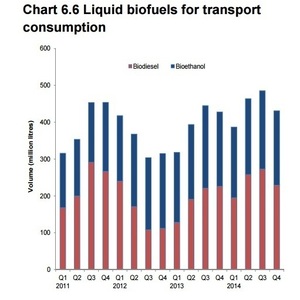UK energy department releases 2014 liquid biofuel data

Image: U.K. Department of Energy and Climate Change
April 14, 2015
BY Erin Voegele
Advertisement
Advertisement
Related Stories
Air New Zealand on Dec. 18 announced its largest purchase of sustainable aviation fuel (SAF) to date, securing more than 30 million liters from Neste to be uplifted from Los Angeles and San Francisco through to February 2026.
Neste and BMW have announced a collaboration for the supply of renewable diesel. BMW will purchase Neste MY Renewable Diesel and use the fuel for the initial fill of diesel vehicles leaving their manufacturing plants in Germany.
Darling Ingredients Inc. on Dec. 10 announced that Avfuel Corp. took the first delivery of sustainable aviation fuel (SAF) produced by Diamond Green Diesel, a 50/50 joint venture between Darling Ingredients and Valero Energy Corp.
Formula 1 has announced it is expanding its investment in SAF through a new program developed with Global Partner Qatar Airways. The expansion builds upon the previously announced investment alongside Global Logistics Partner DHL.
Phillips 66 and United Airlines have signed an agreement under which Phillips 66 will supply sustainable aviation fuel (SAF) to United Airlines at Chicago O’Hare International Airport (ORD) and Los Angeles International Airport (LAX).





